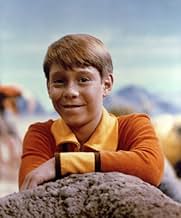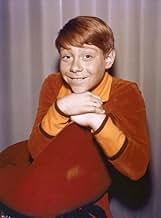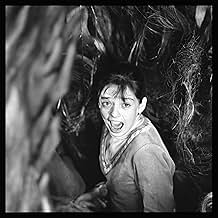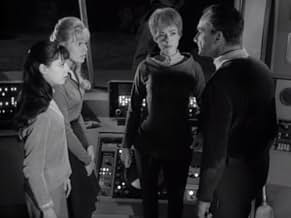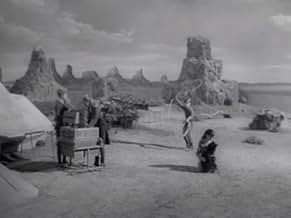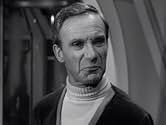A space colony family struggles to survive when a spy/accidental stowaway throws their ship hopelessly off course.A space colony family struggles to survive when a spy/accidental stowaway throws their ship hopelessly off course.A space colony family struggles to survive when a spy/accidental stowaway throws their ship hopelessly off course.
- Nominated for 2 Primetime Emmys
- 1 win & 5 nominations total
Browse episodes
Featured reviews
I guess I'm alone in my views these days, but I've never agreed with the critics (or the vast audiences) that adore contemporary TV series like "Seinfeld" or "Friends."
For me, the best decade for TV (by a million miles) was the 1960s. It was truly a unique decade for television. Series produced then are totally unlike anything produced previously or since. I don't know what it was (perhaps someone spiked the water back then), but TV in the 1960s was unique. There was a certain sense of wonder, a certain sense of the fantastic---and a definite 60s vibe of surrealism that crept into every show from "Green Acres" to "Batman" to "Gilligan's Island."
And for my money, the best show in TV's greatest decade was "Lost in Space." It's impossible to describe what watching this show was like in the 1960s. It's an experience that simply can't be re-produced today. For a start, America was still an optimistic nation and we had an ambitious space program that would soon take us to the moon. For everyone who was young in the 60s, it seemed highly plausible that, we too, would get a chance to ride a rocket into space within our lifetimes. Little could we fathom that, after 1972, America wouldn't even land a person on the moon for 35 long years.
Today's TV shows are stiflingly dull and seem to be created by committees that cynically use focus groups to create their sterile product. "Lost in Space" is a million miles away from this creative process. In fact, it's the total opposite (and all the more brilliant for this).
The greatest science fiction always had a sense of wonder and mystery. "Lost in Space" captured the mystery of space---indeed, the show itself was actually quite bizarre. It's a far cry from the over-rated "Star Trek," which, instead of giving us a sense of mystery, followed an (increasingly stale) by-the-numbers formula.
And "formula" is precisely what one did NOT get in viewing "Lost in Space." Indeed, this show is so strange that, viewing it today, it seems like a relic from a lost civilization. It's hard, in fact, to really even fathom who the producers were targeting as their audience.
Naturally, there are cynics who hate this show, and fall over themselves pointing out the plot holes and the ignorance of "realism." To those folks, I say: Chill out. Even TV's "realistic" shows are NOT as realistic as they hyped to be. "Star Trek," for example, has plenty of flaws in its science. Even a highly-praised show like "ER," the medical drama, has plenty of inaccuracies (as any medical professional will tell you).
In many ways, "Lost in Space" does a wonderful job of capturing the essence of what made the 60s the greatest decade of the 20th century for TV, film, music, and culture in general. It's something we'll never re-capture in today's stale culture, dominated as it is by dull, overpaid celebrities. We've gone a long ways downhill from The Beatles to "American Idol."
For me, the best decade for TV (by a million miles) was the 1960s. It was truly a unique decade for television. Series produced then are totally unlike anything produced previously or since. I don't know what it was (perhaps someone spiked the water back then), but TV in the 1960s was unique. There was a certain sense of wonder, a certain sense of the fantastic---and a definite 60s vibe of surrealism that crept into every show from "Green Acres" to "Batman" to "Gilligan's Island."
And for my money, the best show in TV's greatest decade was "Lost in Space." It's impossible to describe what watching this show was like in the 1960s. It's an experience that simply can't be re-produced today. For a start, America was still an optimistic nation and we had an ambitious space program that would soon take us to the moon. For everyone who was young in the 60s, it seemed highly plausible that, we too, would get a chance to ride a rocket into space within our lifetimes. Little could we fathom that, after 1972, America wouldn't even land a person on the moon for 35 long years.
Today's TV shows are stiflingly dull and seem to be created by committees that cynically use focus groups to create their sterile product. "Lost in Space" is a million miles away from this creative process. In fact, it's the total opposite (and all the more brilliant for this).
The greatest science fiction always had a sense of wonder and mystery. "Lost in Space" captured the mystery of space---indeed, the show itself was actually quite bizarre. It's a far cry from the over-rated "Star Trek," which, instead of giving us a sense of mystery, followed an (increasingly stale) by-the-numbers formula.
And "formula" is precisely what one did NOT get in viewing "Lost in Space." Indeed, this show is so strange that, viewing it today, it seems like a relic from a lost civilization. It's hard, in fact, to really even fathom who the producers were targeting as their audience.
Naturally, there are cynics who hate this show, and fall over themselves pointing out the plot holes and the ignorance of "realism." To those folks, I say: Chill out. Even TV's "realistic" shows are NOT as realistic as they hyped to be. "Star Trek," for example, has plenty of flaws in its science. Even a highly-praised show like "ER," the medical drama, has plenty of inaccuracies (as any medical professional will tell you).
In many ways, "Lost in Space" does a wonderful job of capturing the essence of what made the 60s the greatest decade of the 20th century for TV, film, music, and culture in general. It's something we'll never re-capture in today's stale culture, dominated as it is by dull, overpaid celebrities. We've gone a long ways downhill from The Beatles to "American Idol."
One of the most memorable TV series of all time but whose quality was quite uneven in the three seasons that it lasted. The first season was without a doubt the best, it focused on the adventures of the first family of space settlers who departed from Earth to a planet called Alpha Centaury. Dr. Smith, a collaborator of the project and at the same time a spy in the service of an enemy power, enters the ship to sabotage it, but is trapped in it at the last moment, so the ship will drift in space. Riddled with danger. There were excellent stories in the first season, Dr. Smith was a Machiavellian villain who only thought of himself and did not hesitate to betray the Robinsons in order to achieve his goals. The problem arose in the second season, the series competed directly with Batman, which had quickly established itself as an instant success, in order not to lose audience LIS began to copy Batman's camp style and this greatly reduced its content, the series became childish and even silly at times, the stories focused exclusively on Will Robinson, the Robot and Dr. Smith who had already lost his twisted character to become a buffoonish character. For season 3 the production tried to make a change of direction and return to the quality of the scripts of season 1, a new intro was made and a space capsule was added with which they could descend on other planets without the need to land the ship . The quality was an improvement but they were never able to get back on track. Despite all this, the series is a highly recommended classic.
There are a lot of people who gripe about how the show set out to be dead serious and later became corrupted by the "camp craze" that started with the Batman show. But I like this series from beginning to end, with my only regret being that the show didn't get properly wrapped up at the end.
I like this show because you could see the love Will Robison felt for his father and unlike the dysfunctional television families of today, John Robison had great love for his son; and the bond between John and Maureen was also unshakable. This was a warm and caring family, and I liked that more then some of the silly plots.
That's not to say that I didn't like the plots: often they were silly and made me laugh-- probably when they were trying to be serious, and made more so by the limited budgets and special effects of the '60s. But if you made the same show today, using the most expensive CGI effects, the new show would not have the same warmth and charm, and it would die within a season. It's so sad that writers today don't know anything about what a family should be. Look at the recent movie; see how the producer's '90s view had a troubled Will Robinson, and a self-centered Penny, along with a soulless John Robinson who had all the charm of a brick.
I am glad that Lost In Space is on DVD as well as video and that people can see a great classic television show. So what, there were giant talking carrots! It was one of several funny episodes that I wouldn't miss it for anything in the world. There were some that stank, too, and I wouldn't miss those either. It was overall, a great series. And without Lost In Space, there would not have been a Star Trek. People forget that, too.
I give my respects to the late, great, Jonathan Harris. Doctor Smith, I'll miss you...
I like this show because you could see the love Will Robison felt for his father and unlike the dysfunctional television families of today, John Robison had great love for his son; and the bond between John and Maureen was also unshakable. This was a warm and caring family, and I liked that more then some of the silly plots.
That's not to say that I didn't like the plots: often they were silly and made me laugh-- probably when they were trying to be serious, and made more so by the limited budgets and special effects of the '60s. But if you made the same show today, using the most expensive CGI effects, the new show would not have the same warmth and charm, and it would die within a season. It's so sad that writers today don't know anything about what a family should be. Look at the recent movie; see how the producer's '90s view had a troubled Will Robinson, and a self-centered Penny, along with a soulless John Robinson who had all the charm of a brick.
I am glad that Lost In Space is on DVD as well as video and that people can see a great classic television show. So what, there were giant talking carrots! It was one of several funny episodes that I wouldn't miss it for anything in the world. There were some that stank, too, and I wouldn't miss those either. It was overall, a great series. And without Lost In Space, there would not have been a Star Trek. People forget that, too.
I give my respects to the late, great, Jonathan Harris. Doctor Smith, I'll miss you...
I don't know if combining Forbidden Planet with Seinfeld and Gilligan's Island is exactly on target, but there are elements of all three. I was in second grade when this show premiered, and I never missed an episode. The stories were always interesting to me, and even at age eight the character of Dr. Smith absolutely captured my imagination. There are aspects of this fellow that are so very interesting - here is a guy with a great deal of education who never seems to have learned anything from the mythology he is always reciting to everyone, as in "All That Glitters", my all-time favorite episode. He didn't remember the tragedy of King Midas when he was making his wish? His greed and his cowardice override any mental advantage he may have. He is truly the George Costanza of space exploration - whenever he stumbles upon a piece of good fortune he has to milk it for all it's worth until the whole situation turns on him. Then there are the children - Will and Penny. No matter what Dr. Smith does they still like the guy, and he does a lot. He bargains with aliens to take Will's brain for their experiments instead of his, and in another episode turns Penny into platinum, although he does feel remorse about the latter deed. In fact, the children are Smith's only friends. He is merely tolerated by the adults, and for good reason.
Finally there is the "innocence and chastity beyond reason" element that was part of Gilligan's Island and is part of this show too. Despite the only natural and healthy attraction between Major Donald West and Judy Robinson, we are to believe that nothing really happens between the two for years on end. Also like Gilligan's Island, although the group's first priority starts off as finding a way to return to earth, eventually they settle into a kind of domestic tranquility and seem to make peace with their situation of being "lost in space".
Of course, rewatching this series over forty years later, it is not quite as great as I remembered it, but it is still great fun and Smith is still a fascinating character. It's also interesting to see what people in the 1960's thought earthly civilization would be like in 1997. It's humorous yet somewhat tragic to see the optimistic viewpoint people had of the future in the 1960's pertaining to human nature. What the series' creators couldn't foresee is that today people are much more like Zachary Smith than the Robinson family - at least the people in charge of things are.
Finally there is the "innocence and chastity beyond reason" element that was part of Gilligan's Island and is part of this show too. Despite the only natural and healthy attraction between Major Donald West and Judy Robinson, we are to believe that nothing really happens between the two for years on end. Also like Gilligan's Island, although the group's first priority starts off as finding a way to return to earth, eventually they settle into a kind of domestic tranquility and seem to make peace with their situation of being "lost in space".
Of course, rewatching this series over forty years later, it is not quite as great as I remembered it, but it is still great fun and Smith is still a fascinating character. It's also interesting to see what people in the 1960's thought earthly civilization would be like in 1997. It's humorous yet somewhat tragic to see the optimistic viewpoint people had of the future in the 1960's pertaining to human nature. What the series' creators couldn't foresee is that today people are much more like Zachary Smith than the Robinson family - at least the people in charge of things are.
I think this was the best thing that Irwin Allen ever did. Although the show drifted far away from its original synopsis,the adventures of a family in space, it eventually became the story of a boy and his robot. Bill Mumy became a hot talent in Hollywood after the series and his role as Will as the likeable son is one of TV's most endearing roles. Johnathan Harris was the villain we loved to hate as he became of another of the screen's most versatile character actors. The man showed great talent arguing with an inanimate prop and making it the hero of the show. The unnamed robot, ironically, became more dimensionally than anyone else in the show, and forget Mary Anne vs. Ginger, how many guys had crushes on Penny Robinson than on Judy ? Penny was the adorable ingenue next to the obvious Hollywood presence of Marta Kristen, the first Marilyn Monroe of the galaxy. John and June Robinson, however, slowly became less the leaders and heros of the series as they became closer to Ward and June Cleaver as they spilled out parental advice and punishments. Don West, however, remained mostly the same character without any developments in his character and past, but that can be directly blamed on the series focus between Will, the Robot and Dr. Smith while everyone else became just a little bit more than supporting roles. Despite these few faults, I still think its one of the best things to ever grace television.
Did you know
- TriviaJune Lockhart had the biggest parking space on the 20th Century-Fox lot because she would often drive her favorite vehicle to work - a 1923 fire engine.
- GoofsThe Robot is mounted on tracks. Yet in close-ups when it moves with a normal walking action and it is possible to see the actors legs move in the lower parts of the suit.
- Alternate versionsA pilot episode was filmed that did not include either Robot or Dr. Smith! This film was not broadcast in 1965 but was shown on TV and released to video in the 1990s.
- ConnectionsEdited into The Man from the 25th Century (1968)
Details
- Release date
- Country of origin
- Language
- Also known as
- Lost in Space
- Filming locations
- Production companies
- See more company credits at IMDbPro
- Runtime1 hour
- Color
Contribute to this page
Suggest an edit or add missing content





